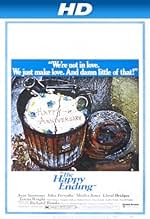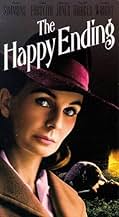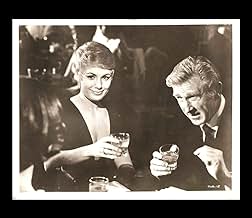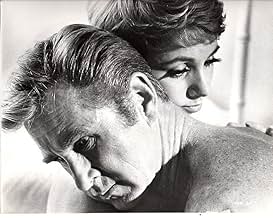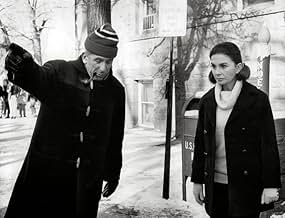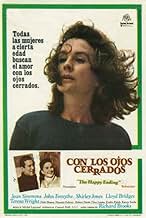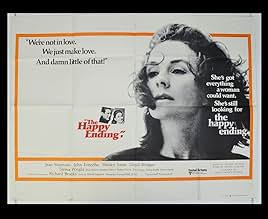IMDb RATING
6.3/10
1.4K
YOUR RATING
A middle-aged woman walks out on her husband and family in an desperate attempt to find herself.A middle-aged woman walks out on her husband and family in an desperate attempt to find herself.A middle-aged woman walks out on her husband and family in an desperate attempt to find herself.
- Nominated for 2 Oscars
- 5 nominations total
Bobby Darin
- Franco
- (as Robert Darin)
William O'Connell
- Minister
- (as Wm. O'Connell)
Ingrid Bergman
- Self - Actress in 'Casablanca'
- (archive footage)
- (uncredited)
Humphrey Bogart
- Self - actor in 'Casablanca'
- (archive footage)
- (uncredited)
- Director
- Writer
- All cast & crew
- Production, box office & more at IMDbPro
Featured reviews
--this film is for you, as you'll hear that song constantly throughout the film.
"The Happy Ending" stars Jean Simmons, John Forsythe, Teresa Wright, Shirley Jones, Nanetete Fabray and Lloyd Bridges, and is directed by Simmons' husband, Richard Brooks. Interestingly, Teresa Wright didn't like his directing and found it pedantic, adding, "but I can't say anything because of Jean." Jean Simmons is one of my favorite actresses and this story serves her well. After twenty years, the lust is gone from Mary Wilson's marriage to husband Fred (Forsythe); she drinks, she pops pills, and finally, after a huge spending spree, her husband takes her credit cards and charge accounts away from her. Her favorite thing is watching old movies which have happy endings; strangely, one of her favorites is Casablanca. Casablanca has a noble ending, even a satisfactory ending. But a happy ending? I mean, Bogie ends up with Louis.
Finally, Mary manages to get her hands on some money, and she takes off for the Bahamas, where she is taken in by an old school friend (Shirley Jones), the "other woman" in several relationships who now finds herself involved with Lloyd Bridges, looking pretty darn good, I might add.
The film seems to be a series of flashbacks and music videos; it is surprising how little dialogue there actually is. Jean Simmons at 40 is radiantly beautiful as usual and she does a great job as Mary. Simmons was a totally underrated actress, squeezed in as she was with the likes of Audrey Hepburn and Elizabeth Taylor. Brooks again has cast Shirley Jones as a bad girl, and again, she's effective. Teresa Wright plays Mary's mother, who can't quite understand her daughter's quest for happiness. Mary wants the fairytale.
I found this film just okay, at times confusing because of the seamlessness of the flashbacks, and frankly, I got sick of hearing "What are you doing...", a song a young man once sang to me and informed me that he had written it. Right.
Anything with Simmons is worth seeing, but at times, this one is tough going.
"The Happy Ending" stars Jean Simmons, John Forsythe, Teresa Wright, Shirley Jones, Nanetete Fabray and Lloyd Bridges, and is directed by Simmons' husband, Richard Brooks. Interestingly, Teresa Wright didn't like his directing and found it pedantic, adding, "but I can't say anything because of Jean." Jean Simmons is one of my favorite actresses and this story serves her well. After twenty years, the lust is gone from Mary Wilson's marriage to husband Fred (Forsythe); she drinks, she pops pills, and finally, after a huge spending spree, her husband takes her credit cards and charge accounts away from her. Her favorite thing is watching old movies which have happy endings; strangely, one of her favorites is Casablanca. Casablanca has a noble ending, even a satisfactory ending. But a happy ending? I mean, Bogie ends up with Louis.
Finally, Mary manages to get her hands on some money, and she takes off for the Bahamas, where she is taken in by an old school friend (Shirley Jones), the "other woman" in several relationships who now finds herself involved with Lloyd Bridges, looking pretty darn good, I might add.
The film seems to be a series of flashbacks and music videos; it is surprising how little dialogue there actually is. Jean Simmons at 40 is radiantly beautiful as usual and she does a great job as Mary. Simmons was a totally underrated actress, squeezed in as she was with the likes of Audrey Hepburn and Elizabeth Taylor. Brooks again has cast Shirley Jones as a bad girl, and again, she's effective. Teresa Wright plays Mary's mother, who can't quite understand her daughter's quest for happiness. Mary wants the fairytale.
I found this film just okay, at times confusing because of the seamlessness of the flashbacks, and frankly, I got sick of hearing "What are you doing...", a song a young man once sang to me and informed me that he had written it. Right.
Anything with Simmons is worth seeing, but at times, this one is tough going.
Jean Simmons makes this compelling viewing. The back-story of the film is that director Richard Brooks, Simmons husband at the time, was concerned and aware of Jean's alcoholism and designed the picture not only as a showcase for her prestigious talent, rewarded with an Oscar nomination, but hopefully a wakeup call for her. It didn't work immediately and eventually helped destroy their marriage but she was able to eventually conquer her demons and live sober until the end of her life. The film itself is a scatter-shot affair what with its frequent flashbacks and fragmented nature but does have a beautiful score and excepting Bobby Darin very good supporting work. Shirley Jones is notable in particular in the smallish role of an old college chum of Jean's. The ending is beautifully done, simple and true.
When I first saw THE HAPPY ENDING, back in 1970, I was blown over by the film's sensitive portrayal of an unhappy housewife trying to decide what to do with her life. I took family and friends to see it and most people liked the film, finding it unusually frank as a portrayal of a failed marriage. I still find THE HAPPY ENDING very good. It is aesthetically rooted in the late sixties but that does not diminish its essential value. The all-star cast is excellent (Jean Simmons, John Forsythe, Teresa Wright, Nanette Fabray, Shirley Jones, Bobby Darin, Lloyd Bridges, Tina Louise) and Jean Simmons might have shared the Oscar with Maggie Smith that year. Both actresses deserved to receive acting honors for their respective roles. I love the jazzy music score by Michel Legrand; Marilyn & Alan Bergman's beautiful song-theme for the film is a perennial favorite of mine as far as romantic songs are concerned. All in all, I will always have a special place in my heart for THE HAPPY ENDING.
I love movies that come down hard against conventional life. And the ones that feature nagging, chronically unhappy, never-satisfied married people go in my "horror" stack, along with Halloween, Videodrome, Suspiria, The Fog, etc. Watching that way of life is enough to fill anyone with ineffable dread.
When you consider that lead actress Jean Simmons and director Richard Brooks (married 1960-1977) were on their way to divorce, that just adds to the terror.
Though it echoes themes in Charlotte Perkins Gilman's The Yellow Wallpaper (1899), The Happy Ending is still seen as a proto-feminist text, which it well may be. I've long held that Jean Simmons (or at least the "Jean Simmons image") is not this quiet, polite, understated "demure beauty" that is somehow constantly breaking out of that particular mold. Ms. Simmons herself can be seen as a "proto-feminist" or strong female lead actress. She demonstrates this in Hamlet, Desiree, Young Bess, The Big Country, and certainly Elmer Gantry; one could actually make this case for many of her films available on video.
Her part in The Happy Ending is really just an expansion of these roles, only this time, the unhappy marriage is brought to the fore instead of subsumed in Hollywood/Happy ending resolve.
It's not just proto-feminist women who feel trapped by marriage; that men get cold feet and then have affairs is almost too cliché to mention or bother to put in quotes. How many movies about extramarital affairs have entertained millions? This film just happens to present the unthinkable horror of when a woman wants out of it. Good for them. 8/10, but be advised, this is coming from someone unable to resist movies about women who don't want to be married.
To this end, see it as a double feature with Baby Doll (1956), or Possession (1981), mess up your mind, a little.
When you consider that lead actress Jean Simmons and director Richard Brooks (married 1960-1977) were on their way to divorce, that just adds to the terror.
Though it echoes themes in Charlotte Perkins Gilman's The Yellow Wallpaper (1899), The Happy Ending is still seen as a proto-feminist text, which it well may be. I've long held that Jean Simmons (or at least the "Jean Simmons image") is not this quiet, polite, understated "demure beauty" that is somehow constantly breaking out of that particular mold. Ms. Simmons herself can be seen as a "proto-feminist" or strong female lead actress. She demonstrates this in Hamlet, Desiree, Young Bess, The Big Country, and certainly Elmer Gantry; one could actually make this case for many of her films available on video.
Her part in The Happy Ending is really just an expansion of these roles, only this time, the unhappy marriage is brought to the fore instead of subsumed in Hollywood/Happy ending resolve.
It's not just proto-feminist women who feel trapped by marriage; that men get cold feet and then have affairs is almost too cliché to mention or bother to put in quotes. How many movies about extramarital affairs have entertained millions? This film just happens to present the unthinkable horror of when a woman wants out of it. Good for them. 8/10, but be advised, this is coming from someone unable to resist movies about women who don't want to be married.
To this end, see it as a double feature with Baby Doll (1956), or Possession (1981), mess up your mind, a little.
THE HAPPY ENDING might not seem special today, and may well seem very dated in some ways, but we must remember this is the pre-DIARY OF A MAD HOUSEWIFE era. I'm sure the film seemed pioneering in its day, questioning the role of the traditional housewife and demanding that women are entitled to the same satisfaction and autonomy that men expected. Writer-director Richard Brooks often dealt with social issues and political themes--that he took on women's issues is no surprise. The film is especially an acting tour-de-force: Jean Simmons as the unsatisfied woman; John Forsythe as the non-understanding but well-meaning husband; Teresa Wright as Simmons' mother; Dick Shawn and Tina Louise as a miserable couple; Shirley Jones as the woman who survived by having affairs with married men; Lloyd Bridges as a married man with Jones as his mistress; Bobby Darin as a lost and lonely gigolo looking for that one big score. I was also impressed by the film's structure--with two parallel stories a year apart and various flashbacks all presented in such a way that the details of the relationship's coming apart are given to us a little at a time, and we are gradually brought to the point where we understand WHY the present state has become what it is. It's quite well-paced and creates tension throughout. Also, the unexpected and non-traditional ending is perfect. It's tempting to wonder what these rich people are whining about when people in the same community are working two jobs, sixteen hours a day, or starving, or dying of cancer, but Ms. Simmons' performance makes us care about and sympathize with her character. The film would perhaps also be of value as an educational tool for future generations who want to understand the ending of the pre-feminist era. Those who enjoy the teaming of stars Jean Simmons and Shirley Jones and director Richard Brooks should also check out his excellent film version of Sinclair Lewis' ELMER GANTRY. Those who know Shirley Jones only from The Partridge Family might be shocked to see what a fine dramatic actress she is!
Did you know
- TriviaJean Simmons has said that the film was a very painful one for her, as she herself was having problems with alcohol at the time. According to Simmons, her then-husband Richard Brooks wrote the film especially for and about her: he hoped that playing Mary might help her to more clearly see her own problems.
- GoofsDuring the opening-credit sequence, many late-model 1960's cars are seen in flashback scenes supposedly set 15 years earlier.
- Quotes
[last lines]
Mary Wilson: If... if right now we were not married, if you were free, would you marry me again ?
- Alternate versionsThe film was originally submitted to the MPAA for an R rating. After United Artists found Richard Brooks' intended cut too depressing, the studio forced to cut the film into a "moviegoer friendly" cut that was rated M. Brooks' R-rated cut was released in other countries as intended but was not released in the United States until 2016.
- ConnectionsFeatures La courtisane (1931)
- SoundtracksWhat Are You Doing the Rest of Your Life?
Music by Michel Legrand
Lyrics by Alan Bergman and Marilyn Bergman
Sung by Michael Dees
- How long is The Happy Ending?Powered by Alexa
Details
- Runtime
- 1h 57m(117 min)
- Aspect ratio
- 2.35 : 1
Contribute to this page
Suggest an edit or add missing content


